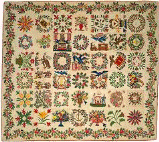Textile Society of America

Textile Society of America: Symposium Proceedings
Date of this Version
2018
Document Type
Article
Citation
Published in The Social Fabric: Deep Local to Pan Global; Proceedings of the Textile Society of America 16th Biennial Symposium. Presented at Vancouver, BC, Canada; September 19 – 23, 2018. https://digitalcommons.unl.edu/tsaconf/
doi 10.32873/unl.dc.tsasp.0026
Abstract
In the newly independent colonies of the American Northeast, styles of white-on-white quilting and embroidery became popular among women coming of age. Considered the epitome of their needleworking skills, whitework required patience, time, focus, precision, and a steady hand. Such detailed stitchwork on pure white cotton-then a booming industry in the American South-prepared these young women to make homes that were meaningful, full of symbolism and care. Drawing analogy between these historic textiles and current movements for decolonization and anti-racism, this talk expands the term Whitework to function as a call to action, for both myself and other white-identified scholars and artists in our field, to collectively face and take responsibility for the colonial underpinnings of our practices. That the Euro-American field of textile studies reflects a vastly imbalanced majority of white practitioners lend urgency to this conversation. This type of Whitework demands that we turn our vocational skills at research, writing, art-making, and public-speaking to the task of examining our own personal and professional lineages. Choosing to engage in Whitework requires us to scrutinize with precision the roles of power, agency, and economics that we as white professionals wield in our work, domestically and as guests in others’ cultures. Whitework recognizes that if we truly wish to achieve an open, inclusive, and decolonized field, major shifts must occur from within our own practices. Part artist-talk, part research paper, this presentation draws on my own experience as a foreign white researcher in Indonesia, the work of artists, scholars, writers, and activists in multiple fields, and the series of Whitework artworks I have been developing alongside the research. With steady hands and such a multiplicity of voices, our field may in fact become what Stephanie Syjuco called for in her closing plenary at the 2016 symposium in Savannah: an ostensibly diverse, interdisciplinary, and multivalent field, fueled by discussion and prepared for inclusion of the voices that succeed us.
Included in
Art and Materials Conservation Commons, Art Practice Commons, Fashion Design Commons, Fiber, Textile, and Weaving Arts Commons, Fine Arts Commons, Museum Studies Commons


Comments
Copyright © 2018 by the author